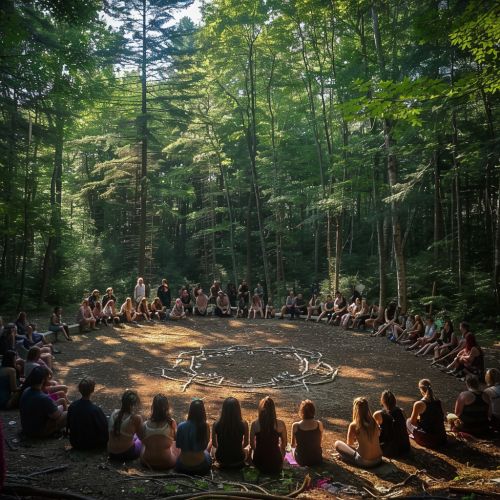Neopaganism
Overview
Neopaganism is a modern religious movement that derives its influences from pre-Christian, pre-Islamic, and indigenous spiritual practices. It is characterized by a diversity of beliefs and practices, but all share a respect for nature and a reverence for the divine as both feminine and masculine. Neopaganism is often associated with the revival of ancient polytheistic religions, including those of ancient Greece, Rome, and Egypt, as well as indigenous European religions. Polytheistic, pantheistic, animistic, and shamanistic practices are common in Neopagan traditions.


History
The roots of Neopaganism can be traced back to the 19th century, with the Romantic movement's idealization of the "noble savage" and the "good old days". This was followed by the revival of interest in ancient religions during the late 19th and early 20th centuries, which saw the emergence of various spiritual movements such as Theosophy, Spiritualism, and New Age. These movements, in turn, influenced the development of modern Neopaganism.
Beliefs and Practices
Neopagan beliefs and practices are highly diverse, reflecting the wide range of sources from which they draw. Some Neopagans practice a specific tradition, such as Wicca, Druidry, or Asatru, while others create their own spiritual path based on their personal experiences and interests. Common themes in Neopagan beliefs and practices include the veneration of nature, the belief in multiple gods and goddesses, the use of magic and ritual, and the celebration of seasonal festivals.
Neopagan Traditions
There are many different Neopagan traditions, each with its own unique beliefs, practices, and rituals. Some of the most well-known include:
Wicca
Wicca is a Neopagan, witchcraft religion that was popularized in the mid-20th century. It has its roots in older, pre-Christian pagan traditions, but also incorporates elements of ceremonial magic, occultism, and folk magic. Wicca is characterized by the worship of a goddess and a god, the observance of eight seasonal Sabbats, and the use of magic in ritual.
Druidry
Druidry is a Neopagan tradition based on the religious practices of the ancient Celtic druids. Modern Druidry is not a direct continuation of ancient Druidry, but rather a reconstruction and revival of what is known or believed about Druidry based on historical and archaeological evidence.
Asatru
Asatru is a Neopagan tradition based on the pre-Christian religious practices of the Norse and other Germanic peoples. It is characterized by the veneration of the Aesir and Vanir, the two families of gods in Norse mythology, as well as the ancestors and the land spirits.
Contemporary Issues
Neopaganism, like any religious movement, faces a number of contemporary issues. These include questions of authenticity and legitimacy, the role of women and gender in Neopaganism, and the relationship between Neopaganism and mainstream society. There are also debates within the Neopagan community about issues such as the use of magic, the nature of the gods, and the interpretation of ancient sources.
